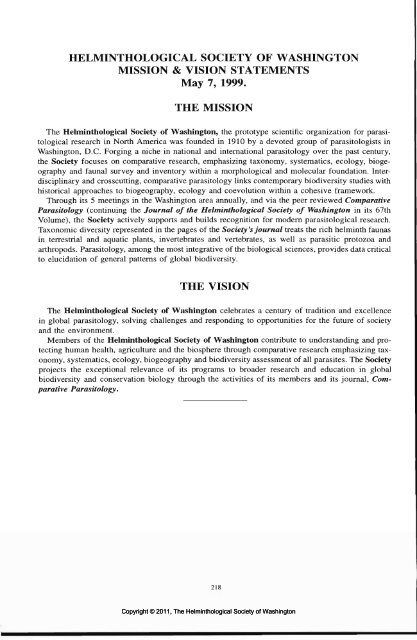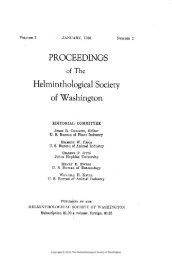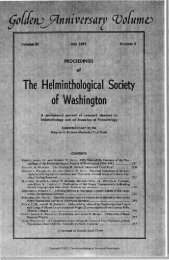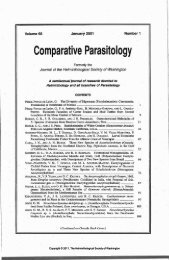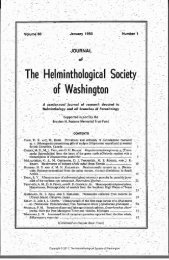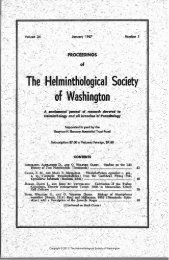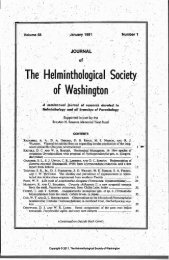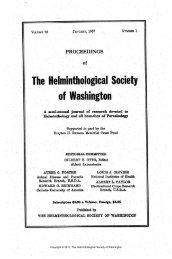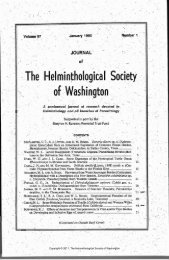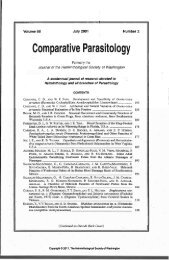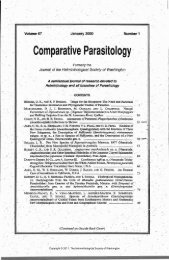The Helminthological Society of Washington - Peru State College
The Helminthological Society of Washington - Peru State College
The Helminthological Society of Washington - Peru State College
You also want an ePaper? Increase the reach of your titles
YUMPU automatically turns print PDFs into web optimized ePapers that Google loves.
HELMINTHOLOGICAL SOCIETY OF WASHINGTON<br />
MISSION & VISION STATEMENTS<br />
May 7, 1999.<br />
THE MISSION<br />
<strong>The</strong> <strong>Helminthological</strong> <strong>Society</strong> <strong>of</strong> <strong>Washington</strong>, the prototype scientific organization for parasitological<br />
research in North America was founded in 1910 by a devoted group <strong>of</strong> parasitologists in<br />
<strong>Washington</strong>, D.C. Forging a niche in national and international parasitology over the past century,<br />
the <strong>Society</strong> focuses on comparative research, emphasizing taxonomy, systematics, ecology, biogeography<br />
and faunal survey and inventory within a morphological and molecular foundation. Interdisciplinary<br />
and crosscutting, comparative parasitology links contemporary biodiversity studies with<br />
historical approaches to biogeography, ecology and coevolution within a cohesive framework.<br />
Through its 5 meetings in the <strong>Washington</strong> area annually, and via the peer reviewed Comparative<br />
Parasitology (continuing the Journal <strong>of</strong> the <strong>Helminthological</strong> <strong>Society</strong> <strong>of</strong> <strong>Washington</strong> in its 67th<br />
Volume), the <strong>Society</strong> actively supports and builds recognition for modern parasitological research.<br />
Taxonomic diversity represented in the pages <strong>of</strong> the <strong>Society</strong>'s journal treats the rich helminth faunas<br />
in terrestrial and aquatic plants, invertebrates and vertebrates, as well as parasitic protozoa and<br />
arthropods. Parasitology, among the most integrative <strong>of</strong> the biological sciences, provides data critical<br />
to elucidation <strong>of</strong> general patterns <strong>of</strong> global biodiversity.<br />
THE VISION<br />
<strong>The</strong> <strong>Helminthological</strong> <strong>Society</strong> <strong>of</strong> <strong>Washington</strong> celebrates a century <strong>of</strong> tradition and excellence<br />
in global parasitology, solving challenges and responding to opportunities for the future <strong>of</strong> society<br />
and the environment.<br />
Members <strong>of</strong> the <strong>Helminthological</strong> <strong>Society</strong> <strong>of</strong> <strong>Washington</strong> contribute to understanding and protecting<br />
human health, agriculture and the biosphere through comparative research emphasizing taxonomy,<br />
systematics, ecology, biogeography and biodiversity assessment <strong>of</strong> all parasites. <strong>The</strong> <strong>Society</strong><br />
projects the exceptional relevance <strong>of</strong> its programs to broader research and education in global<br />
biodiversity and conservation biology through the activities <strong>of</strong> its members and its journal, Comparative<br />
Parasitology.<br />
218<br />
Copyright © 2011, <strong>The</strong> <strong>Helminthological</strong> <strong>Society</strong> <strong>of</strong> <strong>Washington</strong>


